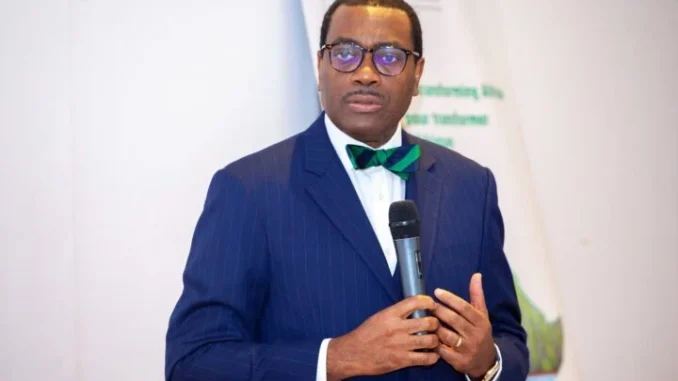

Exposed!! Popular Abuja doctor revealed how men can naturally and permanently cure poor erection, quick ejaculation, small and shameful manhood without side effects. Even if you are hypertensive or diabetic . Stop the use of hard drugs for sex!! It kills!
African Development Bank (AfDB) investment of $614 million in Nigeria’s digital and creative industries is billed to unlock youth entrepreneurship, grow the country’s non-oil economy, and create millions of jobs.
This is as AfDB Group announced the approval a new five-year strategy for Nigeria that will provide about $650 million annually between 2025 and 2030.
Speaking at the 14th Convocation Lecture of the National Open University of Nigeria (NOUN), AfDB President Akinwumi Adesina said the program, known as Investment in Digital and Creative Enterprises (I-DICE), is projected to generate $6.4 billion in economic value and create over 6 million jobs.
How To Overcome Quick Erection And Have A Big Cucumber And Very Strong Also Last For More Than 1 Hour [This Product Will Help You]

“The I-DICE programme is a strategic investment to support access to financing for small and medium-sized businesses in Nigeria’s digital and creative sectors,” Adesina said.
The initiative, jointly funded by the AfDB, the French Development Agency (AFD), the Islamic Development Bank, and Nigeria’s Bank of Industry, represents one of the continent’s largest coordinated investments in digital entrepreneurship. It targets youth-led ventures in key sectors such as fintech, software development, media, design, film, fashion, and e-commerce.
Nigeria already boasts one of Africa’s most vibrant startup ecosystems, with cities like Lagos and Abuja serving as hubs for fintech, health tech, and creative startups.
Despite a 22 per cent year-on-year decline in deals value and 28 percent drop in volume, Nigeria led the African continent with 16 percent of the total $3.6 billion Venture Capital (VC) deals in 2024, a new report by the African Private Capital Association (AVCA).
But despite growing investor interest, access to early-stage funding, skills development, and regulatory support remains a challenge for many entrepreneurs.
“While 15 million young people enter Africa’s labor market annually, only 3 million jobs are created. The rest are left behind,” Adesina noted. “We must turn job seekers into job creators and that is what I-DICE is designed to do.”
Africa’s digital economy is expected to contribute $180 billion to the continent’s GDP by 2025 and a staggering $712 billion by 2050. The AfDB’s focus on Nigeria, Africa’s fourth largest economy and most populous nation, reflects the potential to scale digital and creative innovation across the region.
Adesina said the programme would also help address the “education-employment mismatch” by funding digital skills training, incubation hubs, and technical assistance for startups. Many African youths, he said, graduate with degrees misaligned with market demand, especially in fast-growing sectors like cloud computing, AI, and digital media.
To close this gap, the AfDB is complementing I-DICE with its broader Skills for Employability Action Plan, which has already committed $682 million to skills development projects across the continent, with another $809 million planned for 2024/2025.
“Africa’s future will be driven by its youth and powered by innovation,” Adesina said. “Programs like I-DICE will unlock that potential and make Nigeria a global player in the digital economy.”
In an era where oil revenues are volatile and unemployment remains high, the I-DICE initiative signals a long-term shift toward knowledge-based, inclusive growth. For Nigeria’s young entrepreneurs, it offers not just funding, but a pathway to formalisation, global visibility, and long-term sustainability
Meanwhile, the African Development Bank Group has approved a new five-year strategy for Nigeria that will provide about $650 million annually between 2025 and 2030.
The funding aims to drive economic transformation, build resilience, and create widespread prosperity across Nigeria, according to a statement released Thursday on the Bank’s website.
The plan will deliver $2.95 billion during its first four years, with an additional $3.21 billion expected from development partners.
“This strategy takes a transformative partnership between the Bank and Nigeria to a new level,” said director general of the African Development Bank’s Nigeria Office, Abdul Kamara.
“By investing in sustainable infrastructure and inclusive agricultural growth, we are not only building roads, power systems, and transforming agriculture – we are building pathways to prosperity for millions of Nigerians.”
The strategy focuses on two main priorities: developing climate-friendly infrastructure to boost competitiveness and industrial growth, and promoting green economic growth that includes women and youth.
A key goal is addressing Nigeria’s infrastructure gap, estimated at $2.3 trillion between 2020 and 2043. The Bank will invest in environmentally-friendly roads, electricity expansion, clean water systems, and agribusinesses that create jobs, particularly for women and youth.
These investments are expected to help Nigeria double its economy to $1 trillion and create approximately 1,561,000 jobs.
The strategy aligns with Nigeria’s own development plans, including Agenda 2050, the National Development Plan 2021-2025, and the 2023 Renewed Hope Agenda. It also aims to help Nigeria benefit from the African Continental Free Trade Area by improving energy access, transportation networks, and market access.
Women entrepreneurs will receive special support through programs like the Affirmative Finance Action for Women in Africa initiative, while youth will gain skills to address unemployment challenges.
The Bank added that investing in greener, more resilient infrastructure and agricultural systems will strengthen Nigeria’s ability to handle climate challenges, reduce the impact of floods and droughts, ease farmer-herder conflicts, and build a more resilient economy.
